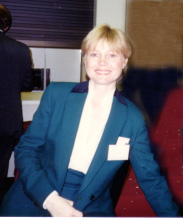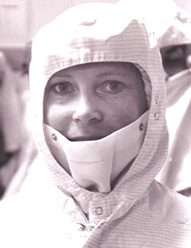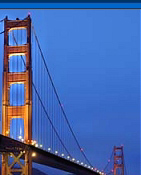|
In January 1990 Lana organized a seminar at San Francisco State
University School of Business, sponsored by a student organization
called the U.S.-Soviet Business Institute, about the latest technologies
in Russian software, "U.S.-Soviet Personal Computers."
 The
speakers were Russian programmer Alexei Pazhitnov, who wrote the
wildly popular Tetris game; Arkady Borkowski, who
showed his English-Russian translation program to be marketed in
the U.S.; Leonid Evenko, chief of the Department of Management Studies
for the USA-Canada Institute of the Soviet Academy of Sciences;
Cecile Shure, export licensing of sensitive technologies specialist;
Lee Felsenstein, president of Glav-PC, the US-USSR joint software
development venture. The
speakers were Russian programmer Alexei Pazhitnov, who wrote the
wildly popular Tetris game; Arkady Borkowski, who
showed his English-Russian translation program to be marketed in
the U.S.; Leonid Evenko, chief of the Department of Management Studies
for the USA-Canada Institute of the Soviet Academy of Sciences;
Cecile Shure, export licensing of sensitive technologies specialist;
Lee Felsenstein, president of Glav-PC, the US-USSR joint software
development venture.
In June 1990 Lana was a translator and organizer for "Silicon
Summit," at the Techmart in Santa Clara, which followed
Gorbachev's visit, giving U.S. high-technology firms a chance to
meet senior representatives of the Soviet computer, telecommunications,
and software industries.
The 11-man delegation, comprising directors of major Soviet technology
development centers, said they want to trade their technological
know-how and product breakthroughs in areas as diverse as robotics,
semiconductor manufactoring equipment, chip design equipment, thin
film processes, parallel processing and software design. In addition
to transferring some key technologies to the USA, the Soviets would
like to manufacture some American products in Russia under contract
from American companies.
The delegation toured several prominent technology companies, including
Sun Microsystems Inc. of Mountain View, Advanced Micro Devices Inc.
of Santa Clara, and Cypress Semiconductor Corporation. T.J Rogers,
Cypress Semiconductor President wanted so badly to do business with
a visiting delegation of Soviet technologists that he put on a capitalist
full-court press, complete with stretch limousines and a blaring
brass band.

The delegation toured the assembly room at Cypress Semiconductor
before making an agreement.
|









